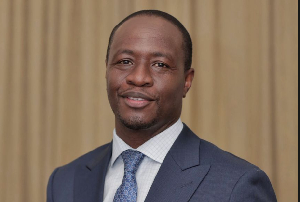Opinions of Tuesday, 12 May 2009
Columnist: Senyo Akaba
The Loud bang of motor accidents.
The inaudible whispers of human rights voices.
President Obama says he has began seeing “glimmers of hope” in the US economy, but not the same can be said about the safety of Ghanaians on Ghana’s highways, and feeder roads. Assistant commissioner of police, David Avorga, stunned Ghanaians with these revelations: 602 people have died through motor accidents in the first quarter of the year. These involved 4,199 vehicles. 399 people died within the same period in 2008. This represents an increase of about 77.58%. The central Region, rated the poorest area in the country, recorded 153 deaths – the highest in any region within the period. The Ghanaian Times newspaper quoted 2,051 as the number of people who sustained injuries through motor accidents between January and April 2009. Of course, the degree of injury was varied. Perhaps, it ranged from minor bruises to permanent disability.
At a middle-of-the-road increase of 50 percent, all things sadly staying equal, the death toll could rise to about 903 year ending 31 December 2009. Putting the death toll and number of injured in the first quarter together, an alarming casualty figure of 2,654 is reached. Again, a conservative increase of 50% will push the total casualty count to a tragic 3,981 before the close of year. Already, government spending on motor accidents is about 1.6% of Ghana’s Gross Domestic Product (GDP). If the trend is not stopped, this figure is likely to go up within two years. What about the impact on poverty, especially the Central Region? If the country had very efficient data collection and management centers, links between motor accidents and other problems like broken homes, armed robberies, teenage pregnancies, and many more could be clearly identified.
I was reflecting on these tragedies on a Friday evening, after work, when suddenly a past incident popped into my head. It happened in the heart of Accra, right in front of the 37 Military Hospital. Soldiers on guard around the hospital were alleged to have dragged drivers to the hospital morgue, on a visit the drivers didn’t plan, for violating traffic regulations in front of the hospital. The visit might have frightened the drivers. A section of society roared in solidarity with these drivers of commercial vehicles. Pundits analyzed the extent of human rights abuse they might have endured at hands of the beastly military force.
Apparently, it was an unfortunate day in Ghana’s post slavery history. However, a caller to an Accra FM station argued that what happened only allowed the drivers to reap the whirlwind. Surely, this caller didn’t have a relative amongst these drivers. Perhaps, he’s ever lost a loved one through the recklessness of a driver. That is the tightrope that many in our country walk on. Have a driver as a close relative and you’ll try to defend his human rights at all times. Lose a special person, especially at a young age, to reckless driving and you’ll call for the head of any reckless driver. These accidents! They break families and end great destinies. They affect innocent lives – men and women, tall men and short women, professors and school dropouts, Catholics and atheists, politicians and farmers. Precious lives indeed!
According to ACP Avorga, commander of the Motor Traffic and Transport Unit of the police service, driver errors account for most accidents in Ghana. Drivers errors include: speeding, erroneous overtaking, drunk driving, overloading of vehicles and many more. And very often, the drivers commit these errors calculatingly. Perhaps the calculation is toward creating more funerals. Ours is a country where funerals are merry occasions; where people drink, dance, network, and engage in indiscriminate casual sex. How can one be sure some of these drivers really understand the impact of death when, perhaps, they also fall into the category of those who make merry on such solemn occasions? Perchance, they even make more money when mourners troop to hire their vehicles to funerals.
Thus, I ask, what is the human rights abuse in taking drivers who flout crucial traffic rules to see the gory details of what their impudence could result into? What about the rights of Ghanaian and foreign passengers to life? What about the right to education which is denied orphans whose parents died in avoidable motor accidents? Do families who lose breadwinners and are forced by such motor accidents to morgues to identify crushed corpses of relatives complain of human rights abuse? “Two wrongs don’t make a right,” the human rights pundits say. But, they’ve forgotten too soon that neither does a “single” but incessant recklessness make a right.
Once again, the debate on curbing road accidents has started. The president invited stakeholders to join, yet human rights watch groups haven’t been “roaring” loudly enough. Rather than beat war drums over the rights of drivers who intentionally flout traffic regulations, wrecking families and the nation in the process, human rights pundits should rather start suggest ways to stop the carnage on Ghana’s roads. Let’s hear their views on light cargo vehicles being converted to passenger carrying buses. What about huge trucks breaking down in the middle of the road, without warning signs? What about drivers who turn their vehicles, often with expired road worthy certificates, into formula one racing cars on the Accra-Cape Cost, Accra-Kumasi roads? Where were the human rights moguls when the US attacked and killed three pirates who took the captain of Maersk Alabama hostage? Drastic situations sometimes oblige far-reaching solutions. Keeping faith with the same pettiness which caused the problem could end with us paying grievously for several generations. The soldiers might have been wrong, but “all that is essential for the triumph of evil is that good men do nothing”, asserts Edmund Burke. If the soldiers were wrong at all, then let’s have someone from the community of human rights activists to give us the right solution to the irresponsibility on our roads.
When rights are mixed with responsibilities and none is varied to the disadvantage of the other, our roads will be safer, precious lives will be preserved, and life expectancy, currently at about 55, will improve. Only then will the cry of human rights make absolute sense. For now, it only seems to be protecting perpetrators of violence, crime and irresponsibility. And that does not make sense.
Senyo Akaba Human Responsibilities Campaigner














